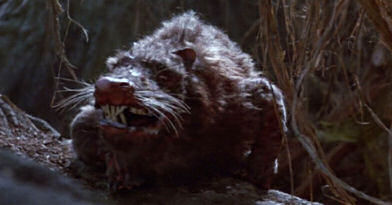© 2007 All Rights Reserved. Do not distribute or repurpose this work without written permission from the copyright holder(s).
Printed from https://danginteresting.com/this-looks-like-a-job-for-vermin/

The common rat is hideous thing to behold. Two species make up what we call the true rat: the black rat Rattus rattus, and the wharf rat Rattus norvegicus. On the whole of the Earth, the only places where rats do not find a home are the forbiddingly cold Arctic and Antarctic regions, some miscellaneous islands where they haven’t gained a foothold, a wildlife preserve in New Zealand, and Alberta Canada where a concerted effort of riled Canadians will massacre rodents upon a hint that a rat may have infested the province.
Historically the rat has been labeled a pest and more-than-a-nuisance due to their capacity to carry diseases that can infect humans, and their propensity to reproduce like… well… uh… rodents. However, in this wonderfully modern time in which we live the rat is being put to task by their human overlords doing much more productive things.
One promising rat-platform is the Pouched Rat, a nocturnal native of Africa. Because they forage for food at night, they are endowed inordinate acumen in their sense of smell. Though these rats are often considered a menu item in their native sub-Saharan Africa, a fellow by the name of Bart Weetjens thought that he could find a better use for the creatures. Africa’s lands have been host to a collage of armed conflicts, leaving the landscape strewn with landmines. The rats’ propensity for speedy reproduction makes them plentiful enough to dare risk them in the hazardous job of sniffing out such hazards. Fortunately, these foodstuffs are apt to be trained.

In the way Pavlov trained his dogs that food comes with the bell, the rats are trained that food follows a human-made clicking sound. Once that lesson is ingrained, the rats are then exposed to a test scenario where they are confronted with a set of holes; if the rat indicates the hole that is emitting “bomb scent”, the trainer clicks, and a treat is presented. In the field, the leashed varmints need to guide a handler through checking 1,000 square feet for explosive. Because a mistake could cost life and limb of both the rat and handler, the rat is given a final exam before being put in the field to perform the real work: The rat must run a mock-up minefield and identify every mine in the gamut in order to pass and be pressed into service.
Of course, there are concerns about the mine-sweeping rats. Some critics decry that animals cannot be as accurate as man-made alternatives such as a metal detector or mine-sweeping robots. The retort is that the rats are not distracted by the metal flotsam as metal detectors are, and that these poverty-stricken areas haven’t the means to acquire robots. According to a report in the Washington Post, there are some people who see a mine-sweeping robot limping over a field, burning and smoldering after successfully locating several bombs, and order the test stopped because it’s inhumane to the robot.
Rats’ slick, agile frames are also well suited to complex searching, but usually such tasks defy their small brains. To remedy this shortcoming, researchers have tried sticking a bunch of electrodes directly into the rats’ brains to enhance their skill set.

The enhanced rats were envisioned in 2001 as a means to delve into wreckage and seek out human victims or survivors. The experiment is funded by DARPA. Essentially, they insert a series of electrodes into the rat’s brain, and tie them to a remote-control that is strapped to the rat’s back. An impulse can trigger a whisker sensation, prompting the beasties to turn, and upon turning correctly and continuing on course, they receive a zap directly to the pleasure center of the brain. After a reported “five or ten minutes” of positive reinforcement, the rats are effectively trained to follow instructions from the remote control. This method of guiding the rats works quite well, though it doesn’t seem to function well for the intended purpose. There are difficulties in guiding a remote-controlled rat through a maze that the controller cannot see. There are some who feel that the occupation of searching disaster areas is too dangerous to ethically employ living creatures.
Though the rat-tasks currently being pursued may not prove to be practical, there may be some future benefit to knowing how to bend the prolific vermin to our will. It might be that in the future the rat will become a contributing member of our society; perhaps consigned to menial labor like removing litter, or following cables. Or maybe bionically enhanced rodents will become our new overlords… until the wrath of Alberta falls upon them.
© 2007 All Rights Reserved. Do not distribute or repurpose this work without written permission from the copyright holder(s).
Printed from https://danginteresting.com/this-looks-like-a-job-for-vermin/
Since you enjoyed our work enough to print it out, and read it clear to the end, would you consider donating a few dollars at https://danginteresting.com/donate ?